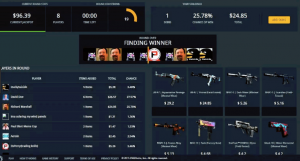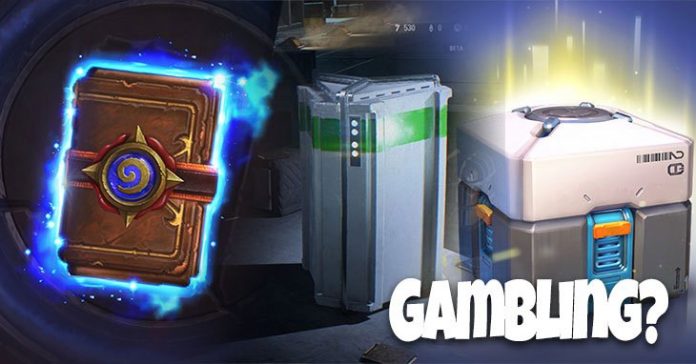An international coalition of gambling regulators has been formed to combat gambling in online video games across Europe.
As online video games have grown in popularity, and competition increased exponentially, game designers have looking for new ways to drive revenue. One of these ways has been to include something called ‘loot boxes’ in their games, in which players pay real money for a loot box that may or may not contain something that the player’s avatar can use in the game.
Regulators around the world have been expressing concern that loot boxes are actually a form of gambling that has no age restrictions or oversight.

The rise of loot boxes
 Loot boxes first gained national attention in the U.S. with the release of Star Wars Battlefront II, by Electronic Arts. After the game’s release, exacerbated players became increasingly more vocal over the presence of loot boxes as many believed they were being forced to gamble to be able to maximize their game play.
Loot boxes first gained national attention in the U.S. with the release of Star Wars Battlefront II, by Electronic Arts. After the game’s release, exacerbated players became increasingly more vocal over the presence of loot boxes as many believed they were being forced to gamble to be able to maximize their game play.
With production costs mounting for high end video games and retail prices largely stagnant since the late 1990s, loot boxes as a way to drive revenue first appeared in Blizzard’s Overwatch in 2016 and have now become standard features in games such as FIFA 17, Middle-earth: Shadow of War, Halo 5, Gears of War 4, Forza Motorsport 7, and Star Wars battlefront II.
Back in 2017, the Entertainment Software Rating Board (ESRB), the industry watchdog that rates games for sex, violence and other age appropriate factors, declined to classify loot boxes as a form of gambling, stating instead that loot boxes “are a voluntary feature in certain video games that provide players with another way to obtain virtual items that can be used to enhance their in-game experiences”, according to the website Tom’s Guide.
The ESRB went on, in February 2018, to release a new label for games that include loot boxes, downloadable skins or other sorts of in-game purchase options.
However, legislators and gambling regulators are taking a different view of the practice. Rep. Chirs Lee of Hawaii put out a statement saying that loot boxes were “predatory practices”, going so far as to call Battlefront II a “Star Wars-themed online casino”.
The gaming regulator in Belgium has gone as far as calling Battlefront II’s loot boxes a game of chance that involves both money and addiction. Both Belgium and the Netherlands have now banned games featuring loot boxes.
The need to protect children
The international coalition of gambling regulators looking to address gambling in video games includes France, Ireland, the Netherlands, the United Kingdom, Norway, Poland, Spain, Portugal, Austria, Gibraltar, Latvia, the Isle of Man, Malta, Jersey, and the Czech Republic, but the United States has yet to weigh in on the issue officially. The coalition has issued a declaration detailing their concerns and the measures they feel should be taken to stamp out gambling in video games.
The most significant concern seems to be the ability to protect children. There are no age requirements for online video games, meaning that even very young children could be exposed to a form of gambling while playing the games.
Skin betting problem
 Another area of concern for the regulators is what is called skin betting. Skins emerged as an offshoot of an update to Counter-Stroke: Global Offensive (CS:GO), a game released in 2012 by Valve via an online platform known as Steam. While the game itself remained essentially the same, a new feature was added that allowed players to purchase decorative covers for their weapons known as “skins”.
Another area of concern for the regulators is what is called skin betting. Skins emerged as an offshoot of an update to Counter-Stroke: Global Offensive (CS:GO), a game released in 2012 by Valve via an online platform known as Steam. While the game itself remained essentially the same, a new feature was added that allowed players to purchase decorative covers for their weapons known as “skins”.
Skins now refer to costumes or designs purchased in-game for real money that allow players to embellish their avatars to make game play more attractive.
Valve’s Steam platform was quick to launch something called Steam Market. Much like an App Store, the Steam Market created a market for skins, which were valued based on their popularity. Money deposited in the Steam Market would be converted to points used to buy skins.
As the market grew in popularity, skins became their own sort of currency, with money deposited converted to points to trade in skins but with no way to withdrawal credits and convert them back into real money.
In time a series of third-party websites arose which allowed players to use their skins for other activities, such as online gambling with players watching live streams of different games and using their skin points to wager on the outcome. Sites even emerged that would allow players to wager their skins in games of online roulette, with sites such as CS:GO Fast, CS:GO Bux and CS:GO Wild offering roulette spins every 30 seconds.
In response to the growing market for gambling in skins, Valve issued cease and desist orders to 23 skin gambling sites back in 2016, only 11 shut down their services and the market has since grown.
Undeterred, vloggers such as Syndicate and Tmar Tn uploaded videos to You Tube showing themselves betting with skins and pulling down large sums of money on the site CS:GO Lotto. The videos, with titles like “How to win $13,000 in 5 minutes” were viewed millions of times but neglected to mention that the vloggers actually owned the CS:GO Lotto site.
The dangers of such forms of unregulated gambling to children, regulators argue, are obvious. Video games and the You Tube channels used to market CS:GO skin trading and gambling have no age limits, potentially exposing very young children to harm.
The 15 EU state regulators that signed the declaration have raised the red flag on loot boxes and skins and are now urging video game makers to step up to do their part to eliminate the potentially harmful practices and coordinate with regulators to find solutions to what they see as a dangerous and growing threat to young people.
Disclaimer: All images are copyright to their respective owners and are used by USA Online Casino for informational purposes only.












